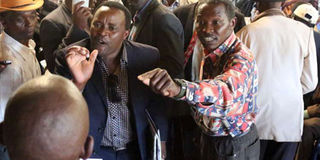MPs want cartels off coffee chain

Farmers confront an official of the Othaya Coffee Farmers Cooperative Society during a forum called by the task force appointed by President Kenyatta to look into issues ailing the sector at the Karatina Catholic Church, Nyeri County, on March 17, 2016. MPs on Wednesday called for the establishment of a commodities exchange to rid the coffee business of cartels that dictate prices at the highly secretive Nairobi auction. PHOTO | NICHOLAS KOMU | NATION MEDIA GROUP
What you need to know:
- Mr Dennis Waweru (Dagoretti North), Mr Waihenya Ndirangu (Kasarani), Mr Irungu Kang’ata (Kiharu) and Manyatta’s John Nyaga told the coffee sub-sector reforms team that marketing of the cash crop must be opened up and all global investors given a chance to participate.
- Coffee sales are controlled by eight people who dictate prices and have ensured Kenyan peasant coffee farmers have no access to information on the true value of their crop at the global market.
- The task force heard that at the commodities market, investors will pitch various prices that will be dictated by demand that could see prices rise to a minimum of Sh3,000 per kilogramme compared to the current Sh58 that is later deducted to settle co-operative societies’ debts with the farmer taking home a paltry Sh30.
Members of Parliament on Wednesday called for the establishment of a commodities exchange to rid the coffee business of cartels that dictate prices at the highly secretive Nairobi auction.
Mr Dennis Waweru (Dagoretti North), Mr Waihenya Ndirangu (Kasarani), Mr Irungu Kang’ata (Kiharu) and Manyatta’s John Nyaga told the coffee sub-sector reforms team that marketing of the cash crop must be opened up and all global investors given a chance to participate.
Coffee sales are controlled by eight people who dictate prices and have ensured Kenyan peasant coffee farmers have no access to information on the true value of their crop at the global market.
"The cartels must be rooted out and all players given a chance to vouch for prices at an open commodities exchange like it happens in New York,” said Mr Nyaga.
RISES IN PRICES
The task force heard that at the commodities market, investors will pitch various prices that will be dictated by demand that could see prices rise to a minimum of Sh3,000 per kilogramme compared to the current Sh58 that is later deducted to settle co-operative societies’ debts with the farmer taking home a paltry Sh30.
Mr Waweru said the government must also wade into the sector by establishing a fund, which will guarantee farmers a minimum price.
Mr Ndirangu said consumption of illicit brew, proliferation of slums and petty crime were on the rise since former workers in coffee estates continue to migrate to urban centres in search of jobs.
Mr Kang’ata called for inclusion of women in management of coffee co-operatives, saying their input at the farms must be recognised, with all payments made to joint accounts owned by a couple.
He called for setting up of minimum education qualifications for all managers of co-operative societies, saying illiteracy is to blame for many of their shortcomings.
The members said there was need to assist individual co-operative societies to engage in value addition, so as to inculcate a culture of coffee consumption in Kenya.





